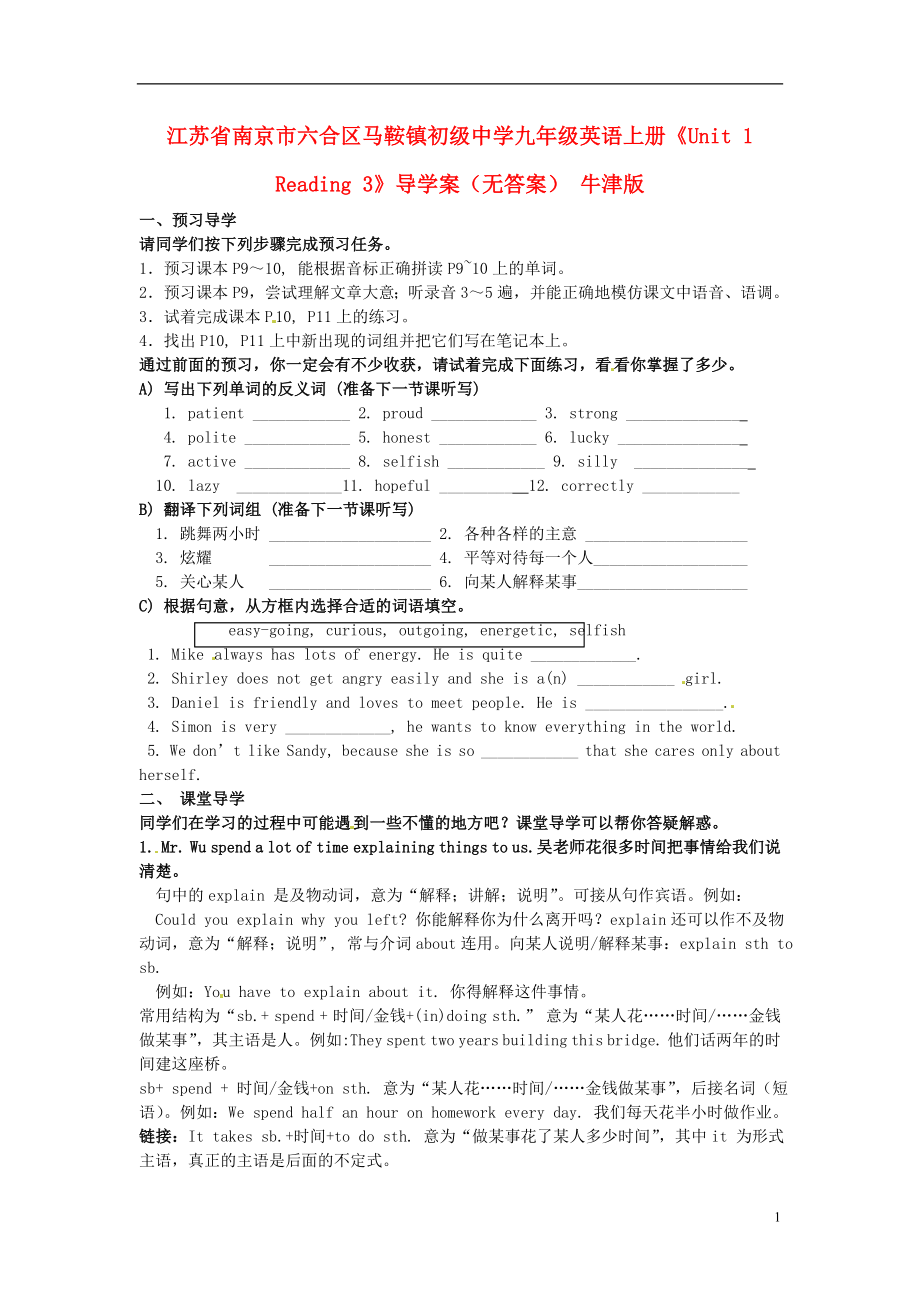《江蘇省南京市六合區(qū)馬鞍鎮(zhèn)初級中學九年級英語上冊《Unit 1 Reading 3》導學案(無答案) 牛津版》由會員分享,可在線閱讀��,更多相關《江蘇省南京市六合區(qū)馬鞍鎮(zhèn)初級中學九年級英語上冊《Unit 1 Reading 3》導學案(無答案) 牛津版(2頁珍藏版)》請在裝配圖網(wǎng)上搜索���。
1�、
江蘇省南京市六合區(qū)馬鞍鎮(zhèn)初級中學九年級英語上冊《Unit 1 Reading 3》導學案(無答案) 牛津版
一����、預習導學
請同學們按下列步驟完成預習任務。
1.預習課本P9~10, 能根據(jù)音標正確拼讀P9~10上的單詞���。
2.預習課本P9�����,嘗試理解文章大意�;聽錄音3~5遍����,并能正確地模仿課文中語音、語調(diào)。
3.試著完成課本P10, P11上的練習����。
4.找出P10, P11上中新出現(xiàn)的詞組并把它們寫在筆記本上。
通過前面的預習��,你一定會有不少收獲���,請試著完成下面練習�����,看看你掌握了多少�����。
A) 寫出下列單詞的反義詞 (準備下一節(jié)課聽寫)
1. patient ____
2、________ 2. proud _____________ 3. strong ______________
4. polite _____________ 5. honest ____________ 6. lucky _______________
7. active _____________ 8. selfish ____________ 9. silly ______________
10. lazy _____________11. hopeful _________ 12. correctly ____________
B) 翻譯下列詞組
3��、(準備下一節(jié)課聽寫)
1. 跳舞兩小時 ____________________ 2. 各種各樣的主意 ____________________
3. 炫耀 ____________________ 4. 平等對待每一個人___________________
5. 關心某人 ____________________ 6. 向某人解釋某事_____________________
C) 根據(jù)句意��,從方框內(nèi)選擇合適的詞語填空�����。
easy-going, curious, outgoing, energetic, selfish
1. Mi
4、ke always has lots of energy. He is quite _____________.
2. Shirley does not get angry easily and she is a(n) ____________ girl.
3. Daniel is friendly and loves to meet people. He is _________________.
4. Simon is very _____________, he wants to know everything in the world.
5. We don’t like San
5��、dy, because she is so ____________ that she cares only about herself.
二����、 課堂導學
同學們在學習的過程中可能遇到一些不懂的地方吧?課堂導學可以幫你答疑解惑���。
1. Mr. Wu spend a lot of time explaining things to us.吳老師花很多時間把事情給我們說清楚�。
句中的explain 是及物動詞����,意為“解釋;講解����;說明”?�?山訌木渥髻e語����。例如:
Could you explain why you left? 你能解釋你為什么離開嗎?explain還可以作不及物動詞�,
6����、意為“解釋�;說明”, 常與介詞about連用。向某人說明/解釋某事:explain sth to sb.
例如:You have to explain about it. 你得解釋這件事情�����。
常用結構為“sb.+ spend + 時間/金錢+(in)doing sth.” 意為“某人花……時間/……金錢做某事”���,其主語是人�。例如:They spent two years building this bridge. 他們話兩年的時間建這座橋����。
sb+ spend + 時間/金錢+on sth. 意為“某人花……時間/……金錢做某事”,后接名詞(短語)���。例如:We spend half an
7���、 hour on homework every day. 我們每天花半小時做作業(yè)�。
鏈接:It takes sb.+時間+to do sth. 意為“做某事花了某人多少時間”,其中it 為形式主語����,真正的主語是后面的不定式��。
例如:It took her two hours to fly to Beijing. 飛往北京花了她兩小時�����。
“cost+(sb.) + 金錢”意為“花了某人多少錢”���,其主語是物。例如:
This dress cost me 200 yuan. 這條裙子花了我200元���。
pay作為“花費”解時���,其主語必須是人,常用短語“sb.+ pay+金錢+for sth.
8���、”,意為“買某物花了多少錢”��。 此處for是‘交換’的意思���。
例如:I paid little money for the ticket. 我買票沒花多少錢。
練一練: 翻譯下列句子:
1) 他花費一小時修理他的自行車����。(兩種方法)
2) 這本書花了我50美元�����。(三種方法)
拓展練習:Mr. Green often spends two hours ___________ (help) his students every day.
2. Daniel is very clever, but he never shows off. 丹尼爾非常聰明��,但他從來不自我炫耀�����。
9����、 show off意為“炫耀(自己的能力���、財力�����、智慧等)”��。例如:
Tom is very proud of his new car. He enjoys driving it to show off.
湯姆以他的新車而感到自豪�,他喜歡開著它四處炫耀���。
鏈接:show sb. sth. =show sth. to sb. 意為“給某人看某物”��。例如:
Would you show me your photos? /Would you your photos to me? 給我看一下你的照片好嗎��?
show sb. around a sp. 意為“帶領某人參觀某地”
10����、����。例如:
He showed us around his factory. 他帶領我們參觀了他的工廠。
練一練: 翻譯下列句子:
1) 他是一個謙虛的人�����,但他從來不炫耀自己�。
2) 我把心給他看。
3) 導游帶我們在博物館四處參觀�。
三、自我評價
同學們通過閱讀預習助手���,一定很有收獲�,快來一顯身手吧��!
A) 用所給詞的適當形式填空。
1. With your help, I can work out this problem __________ (easy).
2. Our class is ___________ (luck) enough to
11�����、win the football game.
3. The boy is ___________ (imagine), but he doesn’t work hard.
4. It’s ___________ (fair) for you not to treat all the students equally.
5. Mr. Wang spent a lot of time __________ (explain) things to us.
6. He hurried off without ___________ (turn) off the lights in the classroom.
B) 根據(jù)漢語提示����,完成下列句子。
2
 江蘇省南京市六合區(qū)馬鞍鎮(zhèn)初級中學九年級英語上冊《Unit 1 Reading 3》導學案(無答案) 牛津版
江蘇省南京市六合區(qū)馬鞍鎮(zhèn)初級中學九年級英語上冊《Unit 1 Reading 3》導學案(無答案) 牛津版

